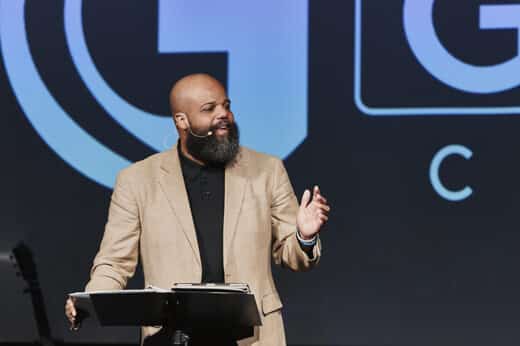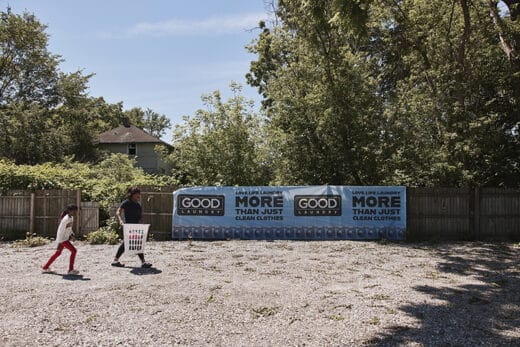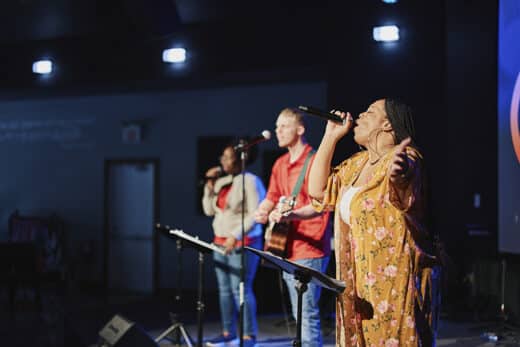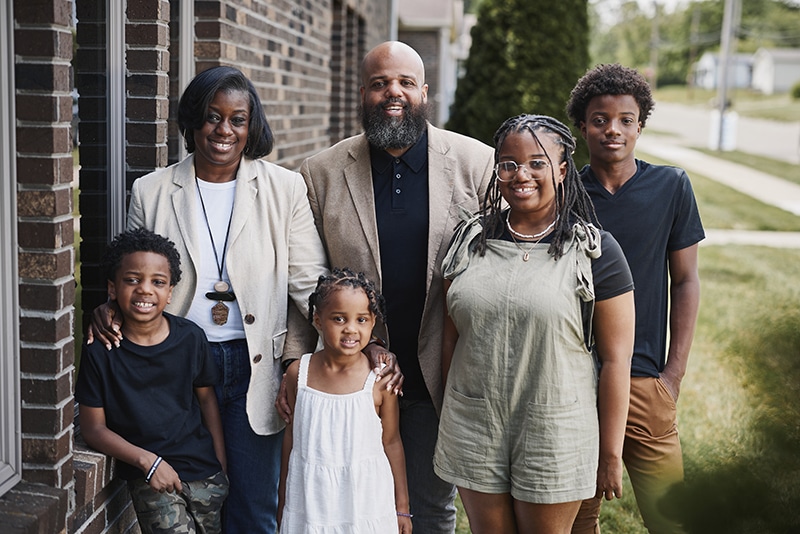Leo and Miosha Robinson know what people think. And it hurts.
“It really gets to me when I tell people we’re from Flint,” Leo says, “They’ll say, ‘Oh, you must hate it there,’ or ‘You must not be able to leave.’ People always have something negative to say, and while I admit we’ve had some dark moments in our past, I still get really sad at how we’re portrayed because we love our city.”

There was a time when Leo Robinson’s childhood neighborhood in Flint, Mich., had plenty of churches. “When I was kid, I think even the chipmunks and squirrels around here were probably saved,” he jokes. But then the GM plant closed, longtime residents moved out, churches started closing, and gospel witness in the community began to evaporate. “That’s when we learned that 80 percent of the people here were unchurched. And that was it for us. We knew we had to plant a church right here.” (NAMB photo by Ben Rollins)
Flint, Mich. — 70 miles north of Detroit — has long been a favored backdrop for TV newscasters and documentary filmmakers wanting to tell stories about what’s wrong with Rust Belt America. Leo and Miosha understand that. After all, they could tell you all kinds of personal stories about Flint’s contaminated drinking water, its high crime rate and its overall urban decay. But their missionary story, even though it begins with a shuttered auto assembly plant, doesn’t fit the commonly held Flint narrative.
Leo spent much of his childhood in north Flint, near the corner of East Holbrook Avenue and Selby Street.
“Growing up, I was a preacher’s kid,” Leo says. “My dad, Leo Robinson Sr., was a pastor here for over 30 years. And back then, this was a vibrant African American neighborhood. There were all kinds of churches here — 16 of them within just a one-mile radius of this corner. We used to say everything around here, even the chipmunks and squirrels, were probably saved.”
Everything changed when the GM plant down the street shut down.
“That’s when the neighborhood started to decline,” Leo says. “The crime rates went up, businesses left, and pretty soon the only people left were the ones who couldn’t afford to move out. That, in turn, had a ripple effect on all the churches here. My dad decided to retire, which resulted in his church closing. And then, lots of other churches in the neighborhood closed, too. And eventually, what you ended up with was a neighborhood with a whole lot of gospel needs, but almost no gospel witness.”
Back then, Leo was working a secular job and would’ve been perfectly happy to continue doing so forever.

There is no laundromat in Leo and Miosha Robinson’s Flint, Mich., neighborhood, and that used to be a problem. “This is one of the lowest income areas in the country,” Miosha says, “and people couldn’t afford to take a bus across town just to do laundry.” That’s why when the Robinsons started Good Church, they also started Good Laundry. “We’re loving people in practical ways,” Leo says. “Now, I can’t wait to spend eternity in heaven with people who came to wash clothes here.” (NAMB photo by Ben Rollins)
“It never entered our mind to do anything else,” he says. “Really, I mean that. Back then, we’d never even heard the term ‘church planting.’”
A 180-degree change in direction came from a most unlikely source.
“We saw a demographic study,” Leo says. “This part of Flint had begun to redevelop, and what we noticed is that even though this neighborhood’s income level hadn’t changed — the yearly household median income here is just $15,000 — almost everything else about this community had shifted. It used to be, north Flint was 92 percent African American. Now it was 48 percent African American and 47 percent Caucasian, and 80 percent of all those people were unchurched. By that, I mean they claimed no faith background. At all. You put those numbers across the sea, and you’ll see missionaries go fast over there. And yet, because this was right here in our old neighborhood, we knew we had to do something. God used that demographic study to pull us into this journey of church planting.”
Several years ago, with the help of Send Network, the North American Mission Board’s church planting arm, Leo and Miosha started Good Church, a multi-ethnic, multi-cultural congregation in the same neighborhood where Leo’s father once pastored. “The name came from Galatians 6:9,” Leo says. “It says, ‘Let us not get tired of doing good for we will reap at the proper time if we don’t give up. Therefore, as we have the opportunity, let us work for the good of all.’”
Leo and Miosha began by walking their neighborhood and asking people, “What do you need?”

The north side of Flint, Mich., used to be almost 100 percent African American. Not anymore. Several years ago, the GM plant down the street closed and everything about this community began to change. Now, Good Church, a Southern Baptist church plant here, is sharing Christ with people from all kinds of different backgrounds. (NAMB photo by Ben Rollins)
“Lots of people we met told us about how there’s not a laundromat anywhere around here,” Miosha says. “That means when they want to wash clothes, since most everybody here depends on public transportation, they have to take all their dirty laundry on a bus and ride all the way across town. It could take four to five hours and cost upwards of a hundred dollars. Children were missing school and adults were missing work just because they didn’t have clean clothes. It’s called hygiene poverty, and we saw a chance right there to meet a need and share the gospel.”
In the lower level of Good Church’s building, they started Good Laundry, a low-cost laundromat where people can now come not just to clean their clothes, but get help with résumé writing, schoolwork, and, most importantly, to hear about Jesus.
“That was our heart,“ Leo says. “That at Good Laundry, our neighbors would meet individuals who would love them in practical ways — and out of that, kingdom moments would happen.”
Now, one kingdom moment after another has grown a church in a place where just a few years ago, there was almost no gospel witness. “Now, I can’t wait to spend eternity in heaven with people who came to wash clothes here,” Leo says. “We knew God wanted to breathe a fresh wind and new life into this place and make this a city on a hill. And He did it with laundry. Isn’t that amazing?”
The Annie Armstrong Easter Offering provides half of NAMB’s annual budget, and 100 percent of the proceeds go to the field. The offering is used for training, support and care for missionaries, like Leo and Miosha Robinson, and for evangelism resources.
— Tony Hudson writes for the North American Mission Board.
